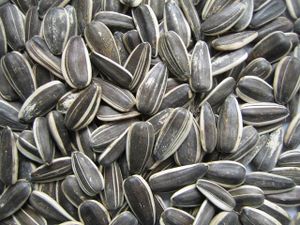Vitamin B1
From Health Facts
(Redirected from Thiamine)
Latest Edit: Iva Lloyd, ND 2021-08-24 (EDT)
| See Also | Vitamins |
|---|
Vitamin B1, or Thiamine to which it is also referred, is a water-soluble micronutrient. It is a part of an important enzyme which is integral to energy production in the body, carbohydrate metabolism, and nerve cell function.
Contents
Food Sources
Other food sources include:[1]
- grains: brown rice, whole wheat
- protein sources:
- Other sources include: soybeans, sunflower seeds, peanuts
- Wheat germ and bran found in whole grains contain vitamin B1, therefore refined grains are stripped of the vitamin.
- Vitamin B1 is sensitive to alcohol, tannins found in coffee and tea, and sulfites; each of these compounds can destroy the vitamin making it useless. It is also sensitive to a factor in uncooked freshwater fish and shellfish.
Uses
Very few conditions warrant large-dose supplementation. The following is a list of conditions where deficiency is often found and supplementation is warranted.[2] [3]
- Beriberi: Relatively rare now that refined grains are being fortified with vitamins.
- Wernicke-Korsakoff Syndrome: People who consume large amounts of carbohydrates (ex. alcoholics) may develop this syndrome which warrants high doses of thiamine.
- Congestive Heart Failure: It is wise for CHF patients on diuretic medication to supplement with thiamine each day.
- Psychiatric Disorders: Approximately 1/3 of psychiatric patients are deficient. Deficiency can heighten anxiety in healthy individuals.
- AIDS: Patients on mainstream treatment (e.g., AZT) would benefit from supplementation due to evidence of some clinical features associated with Wernicke-Korsakoff Syndrome.
- Other conditions which may lead to deficiency: diabetes, Crohn's disease, multiple sclerosis
- Impaired mental function in the elderly, Alzheimer's patients, epileptics being treated with Dilantin/phenytoin.
Deficiency Symptoms
- Beriberi
- Wernickey-Korsakoff Syndrome: serious brain disorder caused by a combination of alcoholism and thiamin deficiency
- General deficiency symptoms include: fatigue, depression, pins-and-needles sensations or numbness of legs, and constipation
Excess Symptoms
Thiamine is not associated with toxicity. The only reaction noted is of hypersensitivity type seen after Thiamine injections. Signs of allergic reaction may include: cardiovascular collapse and death, angioedema, paresthesia, warmth, and rash.
Assessment Procedure
Common Deficiency Tests [4]
- Alpha-Keto acids urine test - a high level indicates a deficiency
- Erythrocyte Transketolase Index - a high level indicates a deficiency
Prescribing Considerations
- Thiamin is available in most nutritional supplements as thiamin hydrochloride Cite error: Closing
</ref>missing for<ref>tag
- Supportive or Beneficial:
- Scopolamine
- Addresses Drug-Induced Deficiency:
- Antacids, Including Aluminum Hydroxide and Magnesium Trisilicate - Drug interferes with absorption of vitamin B1.
- Antibiotics and Antimicrobial Agents (systemic) - Repeated or protracted administration of broad-spectrum antibiotics can destroy beneficial intestinal flora and disrupt healthy gut ecology, including production of B vitamins.
- Furosemide and Other Loop Diuretics - Drug increases urinary output of Thiamin and induces depletion which can contribute to cardiac insufficiency and aggravate congestive heart failure.
- Nortriptyline and Related Tricyclic Antidepressants - Co-administration improves the response to the drugs possibly by addressing a nutrient deficiency or a possible synergistic effect.
- Oral Contraceptives
- Phenytoin and Related Anticonvulsant Medications - Phenytoin interferes with Thiamin function and other anticonvulsants deplete the vitamin.
- Stavudine and Related Reverse-Transcriptase Inhibitor (Nucleoside) Antiretroviral Agents - Thiamin also plays a supportive role in that it helps to decrease lactic acidosis induced by HIV treatments.
- Contraindicated:
- Fluorouracil and Related Antimetabolite Chemotherapeutic Agents - Thiamin restriction and depletion is essential for proper therapeutic functioning of the drug.
- Tetracycline and Related Tetracycline Antibiotics - Thiamin interferes with drug pharmacokinetics and decreases bioavailability.
Nutrient Interactions
Nutrient interactions include: [5]
- Thiaminases - these are Thiamine antagonists found in a few plants, coffee, tea, and some raw seafood (especially carp). Significant ingestion can induce thiamine deficiency. These enzymes are denatured when cooked.
- Chlorinated Water and Chlorogenic Acid - both destroy Thiamine. Chlorogenic acid can be found in decaffeinated and caffeinated coffee.
- B Vitamins and Other Synergistic Nutrients - Thiamine works synergistically with vitamin B2 and vitamin B3.
References
- ↑ Medlineplus [1]
- ↑ Murray Michael T (2005) Encyclopedia of Nutritional Supplements, The Essential Guide for Improving Your Health Naturally, Prima Publishing
- ↑ Hoffer Abram, Prousky Jonathan (2006) Naturopathic Nutrition, a Guide to Health Food and Nutritional Supplements, CCNM Press
- ↑ Bralley J Alexander and Lord Richard S (2005) Laboratory Evaluations in Molecular Medicine, Nutrients, Toxicants, and Cell Regulators Institute for Advances in Molecular Medince, GA
- ↑ Stargrove Mitchell Bebell, Treasure Jonathan, McKee Dwight L (2008) Herb, Nutrient, and Drug Interactions, Clinical Implications and Therapeutic Strategies
